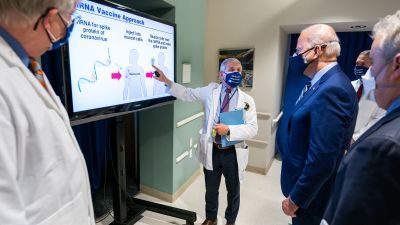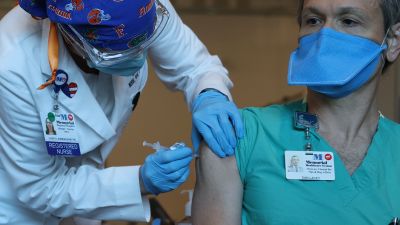
First Response
I know there’s a lot going on. We have insurrectionists in our midst, the president is getting impeached today for an unprecedented second time, the Republican Party is splintering. It’s fascinating and dangerous and infuriating all at once. But we are in a race, a very deadly race, to get the coronavirus under control before a fire of cases engulf us, even more than they are now.
The more transmissible variant is in America, albeit at very low levels. But that won’t last for long; after all, it’s more transmissible. If and when it becomes common, it will be a much bigger problem than if the virus simply mutated to become more deadly. There’s no guessing involved in this prediction. Just check out what’s happening in the United Kingdom.
There, the B.1.1.7 variant is at an advanced stage, responsible for most new cases. One in thirty people in London are infected right now, and a shortage of hospital beds there is expected by next week. Hospitalizations have risen even as cases have lowered slightly from their peak, signaling a possible break in the action amid a near-total lockdown. Deaths have shot up. The Royal Mail has had to be cut back because too many postal workers are sick. Ireland, where almost half of the cases are B.1.1.7, has become the highest per capita case count in the entire world.
The only thing that could possibly put a halt to this outbreak at this point is the vaccination regime. Britain thinks they can vaccinate all people over 70 and those in high-risk occupations by February 15 with at least one dose. That may not be effective but there’s what amounts to rationing going on, a desperate effort to get as many shots into arms and at least some protection as possible as the virus burns.
Since the prospects of another full U.S. lockdown are incredibly remote, we have to think about the effect of a more transmissible virus here, with relative freedom of movement. It’s a simple math equation.
Claire Felter explains it pretty simply with this chart. Even a strain that’s just more transmissible and not more deadly will kill far more people than just a deadlier strain which infects at the same rate. As you exponentially add to cases, there’s just a bigger universe of people infected and therefore a bigger pool of deaths. A strain that is 50 percent more transmissible would lead to five times as many deaths as a strain that is 50 percent more deadly. This factors in overwhelmed health systems, as exponential growth in cases right now when the health system is already stretched would be a catastrophe.
It likely also means that you need more people vaccinated to get to herd immunity, because a more transmissible virus would spread faster and more easily through a population. So you’d have to have near-total coverage with the vaccine to limit the effects.
As Eric Topol notes, based on the numbers out of Ireland and how many B.1.1.7 strains are likely present in the U.S. right now, we have about 12 weeks before we have roughly the same number of cases with the transmissible virus as a percentage of total cases as Ireland.
Where does 12 weeks put us on the vaccination scale? As noted below, we’re at about 10 million vaccinated now. The 1 million/day metric of the Biden administration would mean close to 100 million vaccinated in 12 weeks, but there would be less people covered since some would have received two shots in that period. And since the vaccines are not 100 percent effects, even fewer people would be spared from the worst effects of the disease.
To truly prevent a B.1.1.7 disaster, a back-of-the-envelope calculation suggests we’d need twice as many shots out, and coverage at some level to 100 million people, in that 12-week period. That sounds impossible right now but impossible is what we’ll need. Opening up vaccination to everyone 65 and older is a good start; if we focus on that population we can make strides at avoiding the worst, considering the mortality rates.
That’s a tall order. But it’s the difference between another 100,000 deaths and maybe another 500,000. Eventually, widespread antibodies throughout the adult population will turn this into just another coronavirus, similar to the common cold. But we have to engage in monumental effort to get there.
Vaccinate the Homeless
Maybe it’s because I’m in Los Angeles, one of the homeless capitals of the world, whose unhoused population is part of the great coronavirus surge taking over my city. But you cannot have a more at-risk population than those who have few options to ride out the crisis. Most of the cases are coming from shelters, the one refuge for homeless people. Project Roomkey, an effort to place people in hotels using federal relief funds, was successful in holding off the spread, but that is no longer as effective.
In many areas, homeless shelters are at the top of the list for the vaccine, and if the goal is to minimize death, it’s impossible to argue with that priority. Comorbidities are rampant in this population, and they increasingly have no safe place to go. And of course, outbreaks in areas like jails and encampments and homeless shelters ripple out to the general population through staff. The CDC to its credit has made this a priority, but it needs to be right up there among the populations immunized.
Number of Vaccine Doses Given
9.94 million, up from 9.27 million when on Tuesday. That’s a fallback to around 700,000 doses, compared to 1.2 million the previous day. Connecticut, Rhode Island, Tennessee, Montana, North and South Dakota, and West Virginia are the states that have given out more than half their doses.
Today I Learned
- All international passengers will need a COVID test before entering the U.S. (Wall Street Journal)
- Moncef Slaoui, the head of Operation Warp Speed, will step down amid the transition of power. (CNBC)
- Marco Rubio asks Biden for a standalone bill on $2,000 checks. I continue to say that standalone offers the best chance of early success. (Axios)
- Health workers flocking toward unions as their workplaces face tremendous challenge. (Kaiser Health News)
- Pharmaceutical lobby steps in to say “Don’t prioritize one-shot vaccination and cut us out of half our profits!” (Finanical Times)
- Chinese vaccine not as effective as once thought, according to Brazilian researchers. (CNBC)
- Please don’t party in large groups about your football team’s victory right now. (New York Times)




